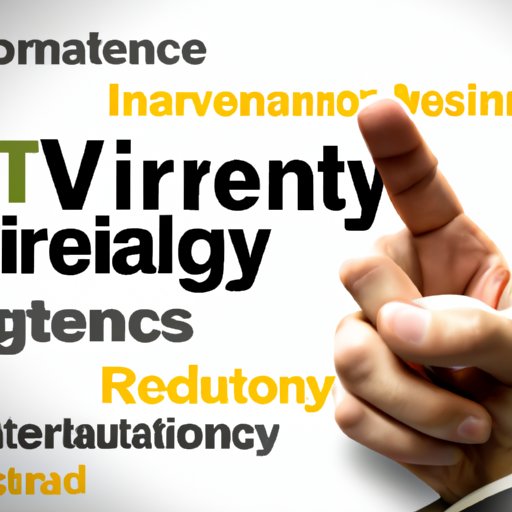Introduction
Integrity in leadership is a quality that many organizations strive to achieve, but one that can be difficult to define. In its simplest terms, integrity is defined as “the quality of being honest and having strong moral principles” (Oxford Dictionary). For leaders, this means demonstrating honesty and consistency in their decisions, words, and actions while adhering to a set of ethical standards. This article will explore what integrity in leadership looks like, the benefits it can bring to an organization, and the challenges associated with maintaining it.

A Profile of a Leader with Integrity
A leader with integrity is someone who is trustworthy and accountable for their words and actions. They are consistent in their values and beliefs, and they demonstrate a commitment to fairness, justice, and truth. Research has shown that leaders with integrity are also more likely to take responsibility for their mistakes and learn from them (Journal of Business Ethics).
Examples of leaders who exemplify integrity include Mahatma Gandhi, Nelson Mandela, Mother Teresa, and Martin Luther King Jr. All of these individuals were committed to standing up for what was right and fighting for justice, even when it was not popular or easy. They demonstrated integrity through their words and actions, and their example has inspired countless people around the world.

How Integrity Affects Leadership Effectiveness
Leaders who possess and demonstrate integrity have several advantages over those who do not. A study by the Journal of Applied Psychology found that leaders with integrity were perceived as more effective and had greater influence over their followers. Additionally, research has shown that employees are more likely to trust and respect a leader who demonstrates integrity (Personnel Psychology).
However, maintaining integrity can be challenging for leaders. If a leader makes a mistake, they must be willing to accept responsibility and make amends. They must also be willing to stand up for what is right, even if it goes against popular opinion or puts them at odds with their peers or superiors. This requires a great deal of courage and strength of character.
The Impact of Integrity on Employee Morale
When leaders demonstrate integrity, it has a positive impact on employee morale. Employees are more likely to trust and respect a leader who behaves ethically and holds themselves accountable for their decisions. This increased trust leads to improved communication and collaboration across the organization, which can result in better performance and higher engagement levels.
Research has also shown that employees are more likely to stay with an organization if they feel that their leader is honest and has strong morals (Industrial and Organizational Psychology). This creates a more positive work environment and reduces turnover, which can save the organization time and money in the long run.
Understanding the Role of Integrity in Organizational Change
Organizations must often make changes to policies and procedures in order to remain competitive. When a leader has integrity, they are more likely to communicate these changes clearly and honestly. This helps employees understand and adjust to the changes more easily, which can lead to greater acceptance and support for the new policies.
Additionally, changes made with integrity can have a positive impact on the overall company culture. By leading with honesty and transparency, leaders can create an environment of trust and respect that encourages open communication and collaboration. This can lead to improved employee morale and enhanced performance.

Exploring the Benefits of Leading with Integrity
Leading with integrity can have a number of advantages for organizations. Research has found that leaders with integrity are more likely to be seen as competent and inspiring, which can lead to improved performance and higher levels of employee loyalty (Journal of Business Ethics). Additionally, leaders who demonstrate integrity can help foster a culture of trust and respect within the organization, which can lead to improved communication and collaboration.

Developing a Framework for Ethical Leadership
In order to ensure that leaders maintain a high standard of integrity, organizations should develop a framework for ethical leadership. This could include establishing a code of conduct that outlines the organization’s expectations for ethical behavior and provides guidance on how to handle difficult situations. Organizations should also provide training and resources to help leaders understand and adhere to the code of conduct.
Examining the Link Between Integrity and Company Culture
Integrity plays an important role in creating a positive company culture. Leaders who demonstrate integrity can foster an environment of trust and respect, which encourages open communication and collaboration. Additionally, employees are more likely to follow leaders who behave ethically and hold themselves accountable for their decisions.
By creating an environment of respect and providing employees with the resources and support they need to succeed, leaders with integrity can help create a positive and productive company culture.
Conclusion
Leading with integrity can bring a number of benefits to an organization, including improved performance, increased employee loyalty, and enhanced company culture. It can also help leaders create an environment of trust and respect that encourages open communication and collaboration. While maintaining integrity can be challenging, the rewards are well worth the effort.
(Note: Is this article not meeting your expectations? Do you have knowledge or insights to share? Unlock new opportunities and expand your reach by joining our authors team. Click Registration to join us and share your expertise with our readers.)
